Papers by Mascha Gugganig
Science, technology & human values/Science, technology, & human values, Apr 4, 2024
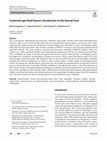
Agriculture and Human Values
Over recent decades, influential agri-food tech actors, institutions, policymakers and others hav... more Over recent decades, influential agri-food tech actors, institutions, policymakers and others have fostered dominant techno-optimistic, future visions of food and agriculture that are having profound material impacts in present agri-food worlds. Analyzing such realities has become paramount for scholars working across the fields of science and technology studies (STS) and critical agri-food studies, many of whom contribute to STSFAN—the Science and Technology Studies Food and Agriculture Network. This article introduces a Special Issue featuring the scholarship of STSFAN members, which cover a range of case studies and interdisciplinary and transdisciplinary engagements involving such contested agri-food futures. Their contributions are unique in that they emerged from the network’s specific modus operandi: a workshopping practice that supports the constructive, interdisciplinary dialogue necessary for critical research and rigorous analyses of science and technology in agri-food se...
Agriculture and Human Values
Scholarship flourishes in inclusive environments where open deliberations and generative feedback... more Scholarship flourishes in inclusive environments where open deliberations and generative feedback expand both individual and collective thinking. Many researchers, however, have limited access to such settings, and most conventional academic conferences fall short of promises to provide them. We have written this Field Report to share our methods for cultivating a vibrant intellectual community within the Science and Technology Studies Food and Agriculture Network (STSFAN). This is paired with insights from 21 network members on aspects that have allowed STSFAN to thrive, even amid a global pandemic. Our hope is that these insights will encourage others to cultivate their own intellectual communities, where they too can receive the support they need to deepen their scholarship and strengthen their intellectual relationships.
Agriculture and Human Values, 2023
Scholarship flourishes in inclusive environments where open deliberations and generative feedback... more Scholarship flourishes in inclusive environments where open deliberations and generative feedback expand both individual and collective thinking. Many researchers, however, have limited access to such settings, and most conventional academic conferences fall short of promises to provide them. We have written this Field Report to share our methods for cultivating a vibrant intellectual community within the Science and Technology Studies Food and Agriculture Network (STSFAN). This is paired with insights from 21 network members on aspects that have allowed STSFAN to thrive, even amid a global pandemic. Our hope is that these insights will encourage others to cultivate their own intellectual communities, where they too can receive the support they need to deepen their scholarship and strengthen their intellectual relationships.
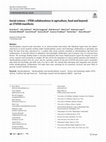
Agriculture and Human Values
Interdisciplinary research needs innovation. As an action-oriented intervention, this Manifesto b... more Interdisciplinary research needs innovation. As an action-oriented intervention, this Manifesto begins from the authors’ experiences as social scientists working within interdisciplinary science and technology collaborations in agriculture and food. We draw from these experiences to: 1) explain what social scientists contribute to interdisciplinary agri-food tech collaborations; (2) describe barriers to substantive and meaningful collaboration; and (3) propose ways to overcome these barriers. We encourage funding bodies to develop mechanisms that ensure funded projects respect the integrity of social science expertise and incorporate its insights. We also call for the integration of social scientific questions and methods in interdisciplinary projects from the outset, and for a genuine curiosity on the part of STEM and social science researchers alike about the knowledge and skills each of us has to offer. We contend that cultivating such integration and curiosity within interdiscip...
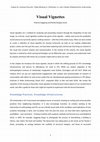
Visual vignettes are a method for analyzing and presenting research through the integration of te... more Visual vignettes are a method for analyzing and presenting research through the integration of text and image. As a format, visual vignettes combine the genre of the vignette-widely used across the qualitative social sciences to succinctly capture a telling moment-with that of the photo essay. When we were invited to curate a collection of visual vignettes for Sensing In/Security we built on our existing collaborative project, where over the past few years, we have been exploring tools and formats that bring our interest in the visual into research analysis and communication. In the context of this volume, the visual vignette becomes a method by which sensing technologies can be differently seen, accessed, and understood, both by analysts and those with whom we as scholars might wish to share our work. In this chapter we introduce the visual vignette, situate it within the shifting grounds of STS's knowledge infrastructures and discuss its affordances for work in STS. While our project originates in the anthropological embrace of multimodal, imaginative work (Collins, Durrington and Gill 2017, Elliott and Culhane 2017) we put our experimental engagements with analysis and communication of research in conversation with efforts to work across media that are simultaneously gaining prominence in STS (Dányi,
Food Studies: Matter, Meaning & Movement, 2022
This dissertation interrogates the different forms that education takes in regards to land across... more This dissertation interrogates the different forms that education takes in regards to land across three different settings on the Hawaiian island of Kauaʻi: a Hawaiian-focused charter school, a food sovereignty movement, and the agricultural biotechnology industry. As ethnographic researcher, I approached Kauaʻi about 15 years after three seemingly parallel developments had commenced: the establishment of Hawaiian-focused charter schools to educate Kānaka Maoli (Native Hawaiians) students on their culture, language and history, a "New Economy" resulting among other changes in a shift in agriculture to research and develop genetically modified organisms (GMOs), and a burgeoning social movement concerned about the impacts of GMOs. Following these developments, I argue that education as a term and transinstitutional practice Acronyms
American Anthropologist, 2020

Ethnos, 2015
ABSTRACT This article investigates the patenting and genetic engineering of the plant taro (Coloc... more ABSTRACT This article investigates the patenting and genetic engineering of the plant taro (Colocasia esculenta), which Native Hawaiians consider their elder brother and ancestor Hāloa. It explores how molecular scientists at the University of Hawai‘i through their research activities inadvertently disrupted this relationship and concurrently provoked a resurgence of Native Hawaiians’ interest in their creation story Kumulipo and connection to their kin Hāloa. The juxtaposition of purportedly value-free scientific practices with a value-laden indigenous epistemology exposes the former's debatable characterisation as ‘objective'. Scientific practices such as patenting or genetically engineering taro are discussed as hybrids that are composed of molecular scientists with real intentions; a plant as kin, ancestor and embodied god Kāne; and an indigenous people with real kinship to a non-human being. In consequence, the described case exemplifies how scientific practices are as malleable and situated as the concept of nature, while both concurrently shape each other.
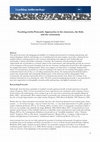
Teaching Anthropology, 2020
This article showcases the pedagogical possibilities of working with postcards for teaching anthr... more This article showcases the pedagogical possibilities of working with postcards for teaching anthropology and related disciplinary fields by introducing a set of multifaceted tools and examples. It provides a framework for tangible reflexive teaching practices and a research methodology that supports, both intellectually and emotionally, a vibrant and mobile community of scholars. We commence with the emergence of the postcard, and its (widely undervalued) role as a research subject in the social sciences. Examples from the arts, literature, teaching and research offer inspiration for engaged and creative teaching formats. These cases support our claim that as seemingly ‘anachronistic’ object of communication, postcards are useful for teaching in the classroom, for teaching ethnography, and for community-based work and teaching. In fact, as a traveling communication device, the repurposed postcard lends itself to connect the oft-physically and conceptually divided spaces of the class...
Culture, Agriculture, Food and Environment
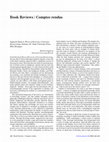
In her first book, Waves of Knowing: A Seascape Epistemology, Kanaka Maoli (Native Hawaiian) poli... more In her first book, Waves of Knowing: A Seascape Epistemology, Kanaka Maoli (Native Hawaiian) political scientist, writer and surfer Karin Amimoto Ingersoll offers a significant account of knowing the ocean. This book joins the ranks of a growing number of critical works by Indigenous scholars that lay bare the colonial-epistemological legacy of a still western lived-in world and scholarship. Classified by the publisher within the fields of Hawaiian Studies, Native and Indigenous Studies, and Political Theory, the book offers a conceptual tool for decolonising and creating a new (political and ethical) foundation of knowing that is relevant beyond these disciplines. A well-grounded, expansive and ethnographic account of the sea, it is written in a poetic way that reflects a still widely unrecognised genre of Pacific Islander scholars – for example, Vilsoni Hereniko – who bring together poetic and scholarly writing. In this tradition, Ingersoll – literally – dives right into the intro...

Science as Culture, 2021
Colonial empires, scientists, philanthropists and Hollywood studios have long sustained an image ... more Colonial empires, scientists, philanthropists and Hollywood studios have long sustained an image of islands as remote places with unique ecologies and cultures, experimental labs, or loci of escapism. The climate crisis and the Covid- 19 pandemic have contributed to a predominant view of islands as both exceptional spaces and testbeds to be scaled up onto continental or planetary levels. Likewise, the metaphor of the island is foundational to Western thought yet has been less explored in the context of scientific processes and technology development. Bringing together science and technology studies (STS) with critical Island Studies and related fields, this special section expands upon the spatial dimension of sociotechnical imaginaries to consider islands and their imaginations as both preexisting and channeling visions of science and technology. The introduced concept of Island Imaginaries captures the mutual constitution of island visions and their materialization in scientific, technological and technocratic endeavors that are imagined and pursued by scientific communities, policymakers, and other social collectives. Such an approach explores the co-constitutive dynamic of islands as sites for the foundation of technoscientific knowledge regimes, and the concomitant rendering of islands as conducive places for discovery and experimentation. The special section offers empirical case studies with insights into islands as synecdoche for larger wholes (the Earth), as experimental and exceptional sites for trialing business creation and political orders (in Singapore, and for Asia), and as variously interpreted laboratory paradise (of Hawai‘i). Further research themes for STS are suggested in the Conclusion.

Public Understanding of Science
This article presents the results of a public engagement experiment on a project trialling ‘verti... more This article presents the results of a public engagement experiment on a project trialling ‘vertical farming’, an emerging technology addressing urban food issues. The experiment developed within an issue mapping project, analysing debates about vertical farming on the digital platforms, Twitter and Instagram. The article presents a software tool designed to engage ‘offline’ publics in the issue mapping process, using images collected from Instagram. We describe testing this software tool with visitors to exhibitions of vertical farming in two science and technology museums. Our findings highlight the predominance of commercial publicity about vertical farming on Twitter and Instagram and the organisation of public attention around technological novelty. The article discusses the challenges such publicity dynamics pose to mapping issues on platforms. We suggest some ways digital methods might contribute to public engagement with technologies, like vertical farming, that are a focus ...
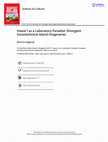
Science as Culture, 2021
Scientific discoveries or testing technical systems are often tied to places deemed central for s... more Scientific discoveries or testing technical systems are often tied to places deemed central for such endeavours. Related technoscientific visions are not merely mapped onto a place like a blueprint, but co-constituted with pre-existing spatial imaginations. This is particularly so in the case of islands. Taking up Hawai‘i’s significance both for natural science and contemporary agricultural biotechnology, and expanding upon the concept of sociotechnical imaginaries (Jasanoff and Kim, 2015), spatial imaginations of islands – as remote, contained spaces – channel, and are channeled by technoscientific, colonial visions and theories. In this context, laboratory and paradise tropes either accommodate or ‘keep out’ science and technology, and find expression in two sociotechnical island imaginaries. In an ecological island imaginary, western-scientific conceptions frame Hawai‘i as a laboratory of nature, and hosting paradise for natural sciences. Anti-GMO activists likewise articulate an ecological island imaginary, yet one of Hawai‘i as laboratory on nature, and nonabsorbable paradise in such slogans as ‘Stop Poisoning Paradise.’ In an agribusiness island imaginary, policy and industry visions portray the Islands as conducive agricultural laboratory where Edenic settings point to a hosting paradise to accommodate advancements of science, technology and business. Laboratory and paradise tropes indicate shared epistemic commitments across diverse sociotechnical island imaginaries, as well as divergences, such as in efforts to decolonize science. An analysis of overlapping and contrary sociotechnical island imaginaries that attends to such key visions allows for delineating heterogeneous dynamics beyond conventional categories like biodiversity, science, or culture.
Multimodal Anthropologies- American Anthropologist, 2020
Uploads
Papers by Mascha Gugganig
by Steven Breckon, Mascha Gugganig, and Jacob Slosberg
April 2011
Produced in the Ethnographic Film Unit, UBC
The image speaks to the Anthropology and Environment Society's interests in that agricultural practices, as any socio-cultural practices, are always entangled in a global world, as visualized in the 'global' cardboard. The eventual dissolution of the cardboard into soil, and thus into communal food production, exemplifies transformation, adaptation, as well as resilience to recreate a subsistence economy on an island that is located within a highly industrialized food system.
Visitors are invited to ‘paradise’ of 15 months fieldwork on the island of Kaua‘i where the presence of several agricultural biotech companies has engaged awareness of land use and local/global food production.
While in their heydays in the early 20th century, postcards served as prime information source, say, of a visited town or country, and in times of emails, skype and whatsapp, I muse – without romanticizing – what meaning postcards/letters may have regained. As Emerson, Fretz & Shaw (2011) point out in Writing Ethnographic Fieldnotes, members’ terms are significant because they convey different meanings of the same thing: among inmates and staff at a cottage for delinquent girls, “buzzes” are illegally smuggled letters, but they are also “love letters” or for guards a form of gang relation in need of regulation.
In this experimental project, postcards become part of doing and rethinking ethnography. Similar to Cerwonka and Malkki, who reconfigure fieldwork email exchanges into a book (2007), I pose what postcards can do as ethnographic tool: What is their role as mode of communication, research dissemination, formation of relationships, fieldwork reflection, material artefact, knowledge infrastructure, and/or fieldnotes?
I invite ethnographers, artists, researchers and related experimentalists to write postcards to a friend, colleague, student, etc. All is allowed. Be creative! Here a few ideas:
Write to a friend, colleague, student, or fellow Colleex member and start a colleex-ship (perhaps you find inspiration in the Dear data project).
Start a conversation with a fellow currently in the field, writing an ethnography, preparing for fieldwork, etc. It could but doesn’t need to be a ‘confessional’ exercise, things you would not want to be in your fieldnotes (perhaps you find inspiration in the PostSecret project. Postcard authors would be anonymized/blacked out).
Write postcards to yourself, perhaps you are currently moving a lot between home, work, research site, etc.
Use postcards as fieldnote or sketch ‘book,’ an ethnographic art project, a way of conveying one’s research content (perhaps you find inspiration in this traveling exhibition).
You are of course also invited to send postcards to me (see below).
Letters are also encouraged, if your hand-writing is large, there is more content you want to share, etc.
Duration
Collect your postcards until the end of March 2018, and send scans, photos or the actual postcards to: mascha.gugganig@tum.de or to:
Mascha Gugganig
MCTS
Augustenstr. 46
80333 Munich
Germany
Reflection on the process
At the end of March 2018, write a short reflection (max. 700 words) on your experiment, what the postcard(s) did for you, what worked, also what didn’t and why, what could be improved, etc. The postcards and your reflections will be posted on the Colleex. The tentative goal is to present this project at the EASA meeting in August 2018, or a related conference/workshop.
If you have any questions, do contact me, and feel free to share this little experiment/exercise with other colleagues, your students and those interested. Thanks a lot for taking part, and I look forward to your postcards!
References
Cerwonka, A., & Malkki, L. H. (2007). Improvising Theory: process and temporality in ethnographic fieldwork. Chicago: University of Chicago Press.
Emerson, R. M., Fretz, R. I., & Shaw, L. L. (2011). Writing Ethnographic Fieldnotes, Second Edition. Chicago: University of Chicago Press.
as guest editors for Science as Culture, we are pleased to share the call for abstracts for the special issue on "Island Imaginaries - from repositories to labs to lived experiences" (Deadline October 16, 2017).
Not least since imperialist and colonial endeavors of ‘discovering’ the world, islands have borne a fascination for outsiders, who have imagined and conceptualized them in various ways. They are central to evolutionary theory as remote places of unique ecologies that serve as repositories of endemic life forms (Beer 1998), attracting scientists at least since Darwin. Likewise, in line with a long European tradition to see islands as essentialist repositories of human societies and political systems, islands have been a locus of social theories since the inception of such disciplines as anthropology and archaeology (Kirch 1986). Most recently, some islands have become alarming signifiers of climate change, eventually leading to their disappearance, destroying human and non-human habitats if no serious political actions are taken.
The potential for interventions on islands has equally been an allure. Colonial empires, militaries, entrepreneurs, philanthropists or Hollywood studios have taken advantage of the remoteness of islands by turning them into experimental labs of the natural, the social, and the imagined. Examples range from extracting resources on islands to complete ruins to nuclear and chemical tests while studying repercussions in inhabitants’ bodies and diets (Barker 2004; Lemov 2005), to evicting colonized island populations for Cold War U.S. built satellite and monitoring systems (Oldenziel 2011). Islands have also served as testing ground for advancing medical treatment of diseases, such as malaria, or as social quarantine for keeping in detention those delinquents, seamen or Indigenous people considered illegible of landing on the shores of ‘mainlands.’ Against the notion of remoteness, island inhabitants’ lived worlds are anything but peripheral, small or immobile spaces but rather emerge as such in contrast to continents (Clifford 2001; Hau'ofa 1993; Mack 2007), leading scholars to call for nissology, the study of islands on their own (Baldacchino 2007; McCall 1994).
Pushing the envelope of both science and technology studies and critical island studies, this special issue develops further understandings of ‘islanding’ as always both imaginative and material processes (Gillis 2004). We pose to further develop the spatial dimension of sociotechnical imaginaries (Jasanoff & Kim 2015) and consider islands both preexisting and channeling visions of science and technology. More specifically, islands constitute repositories as exceptional Other, both in a natural and social sense, that are to be preserved (biodiversity, culture) to maintain respective orders. Likewise, the island has also gained significance as a metaphor for exceptionality and experimentation, or as synecdoche for larger wholes (the world as ‘island’).
This special issue builds on recent scholarship on islands in STS, anthropology, international relations and related fields by querying, first, the normative virtue of conceived ‘natural,’ ‘untouched’ states, and second, the normalizing virtue of experimental interventions for the sake of producing ‘modernity templates’ in often faraway places. The accounts of remoteness by those imagining, testing, and exploiting islands are contrasted with the lived experiences and imaginaries of island inhabitants, such as in regards to climate change, tourist places, or migration. For others, such as those fleeing war and conflict, islands constitute a gateway to a safer live while political regimes are more invested in turning islands into adamant borders.
Expanding upon Gillis’ historical work on island imaginaries (2004), and asserting Oldenziel’s thesis that remote islands are central to the formation of empires (2011), we argue that islands are crucial sites for comprehending global changes and challenges in overlooked geographies. Surprisingly, islands, just as islanders, are still marginalized in research accounts on techno-scientific progressivism and knowledge power relations as spatial concerns. This special issue offers empirical case studies with insights into the centrality of islands in the prevalent production of order, as experimental sites for political orders, for social theory construction (as in contrast to the dominant discourse of remoteness), and for a productive critique of power relations between ‘centers’ and ‘peripheries.’
Contributions could address the following, non-exhaustive questions:
* What role do islands play as the Other to imagined and manifested ‘centers’? How do, often western imaginaries of the ocean (Connery 2005) reassert this prevalent geopolitical order?
* How and why do islands remain off the radar as experimental grounds? In turn, how have islands become visible in the imaginaries of outsiders (paradise, etc.)?
* How do island imaginaries contribute to global power relations, and how does this manifest in established and taken-for-granted (western) natural and social theories, or sociotechnical experiments?
* What are the lived realities of inhabitants who might not see their lives as peripheral, remote or invisible? What politics are indicated by alternative natural and social ordering systems and ontologies of islands?
* In times of climate change and rising sea levels, how has the figurative island become a symbol of environmental global crises, a synecdoche of the world?
* In what ways have islands become laboratories of escapism exporting innovative “off-the-grid” projects?
We invite papers in and across science and technology studies, international relations, indigenous studies, geography, anthropology, history, literary studies, etc. We seek both large-scale analytical and ethnographic accounts of historical and contemporary cases across the globe, and welcome papers that critically investigate islands in its material, imaginative and semantic forms.
The deadline for abstracts is October 16th 2017. Abstracts (in English) with a maximum length of 250 words should be sent (as attachments) to island.imaginaries@gmail.com Notifications of acceptance will be sent by November 2017. Full papers (in English with a length of 7,000 - 8,000 words including notes and references) will be due by February 28th 2018.
We are looking forward to your contributions and feel free to circulate the call!
If you have any questions, do not hesitate to contact us at mascha.gugganig@tum.de or nina.witjes@tum.de
A house being dismantled bears fascination as both a still moment and as a continuous process of revealed layers of the building’s history. The still yet ephemeral moment of static, frozen histories are destined to disappear in the dust of a demolished house. Elegant motions of an excavator tearing down these layers concurrently visualize the human mind operating it. The finalized product, eventually a new house, appears as a cohesive, static masterpiece that the architect is congratulated and recompensed for. At the same time, the technical practices, uses of tools, and team work that lead to such cohesion are disguised by the new building. A constant play between stasis and process, between a captured moment and flow, is reflected in this short film in the use of timely framed photos that are transformed into a moving picture.
The immaculate new house stands as a metaphor for the anthropologist’s finished text, article, book, photograph, film. As for the house, idiosyncratic tools and techniques of the anthropologist are often hidden practices in the relatively private sphere in libraries or at home. They are not to be confused with methods easily available in text books, and thus often remain unidentifiable in the final product, obscured by the dust of (de-)construction. Curiously, the public practice of demolition is commonly perceived as a nuisance in our everyday routines. In order to lessen noisy, loud and dusty processes of transformation, demolition sites are often hidden behind walls painted with the imagined new house complex that is about to replace the old one. These walls cover, even pretend to curtail the liminal stage of neither an old nor a new building. However, in Vienna demolition management rarely bothers to put up such disguising walls. The lack of concern about their image as clean, neatly operating company counteracting the abnormality of dust and visual demolition reveals such transforming, liminal stages as normality. As Victor Turner describes this stage in rites of passage from the perspective of initiates, a transformed landscape of a city is likewise a moment where “basic building blocks of culture” are exposed in this simultaneous entrance and exit stage (1967, 110).
Celebrating the architect’s work furthermore displays the expectation of academic institutions to present consistent, marketable products that scholars are appreciated for. In this way, the scholar is acknowledged for the prestigious architectural white-collar facets of his or her work. The technical blue collar facets that are associated with construction workers remain a mystified matter. The film raises questions concerning the ways anthropology students learn to obscure idiosyncratic uses of tools in the dust of their work in progress. Anthropology, as many other social sciences, still has a strong self-perception as epistemological knowledge production, rather than provoking a more technical perception that crafts toolkits (Boellstorff 2008, 59).
The deconstructed house was photographed in Vienna, Austria in 2009 over a period of about five months. The film was finalized in 2011 with the help of the Ethnographic Film Unit at the University of British Columbia.
October 2011 – Regard Bleu #7. Festival for Ethnographic Student and Film Media, University of Zurich/Switzerland
Mar 2012 – Ljubljana International Short Film Festival 2012
June 2012 – Contro-Sguardi International Anthropological Film Festival, Culture-Work-Multimedia, Perugia/Italy
https://hopeandinsufficiency.wordpress.com/visual-essay-competition/mascha-gugganig/